No matter how this remarkable playoff run ends, Filip Chytil has changed the offseason equation for the New York Rangers.
With the sudden and unexpected emergence of the 22-year-old’s considerable skills during this postseason, Chytil has gone from a player who looked like he needed a change of scenery, and one without an obvious role for next season, to someone who might be the club’s future second-line center.
Chytil has broken out as a dynamic power pivot anchoring the so-called Kid Line, the Rangers’ most effective at even strength as they’ve moved into the Eastern Conference Final, at least partially fulfilling the vision the organization has had for him since drafting him 21st overall in 2017. The starts and stops to his career, the inconsistent play that’s been interspersed with brief flashes of world-class ability, seem to have disappeared as two straight playoff opponents have had trouble containing the 6-foot-2, 206-pounder.
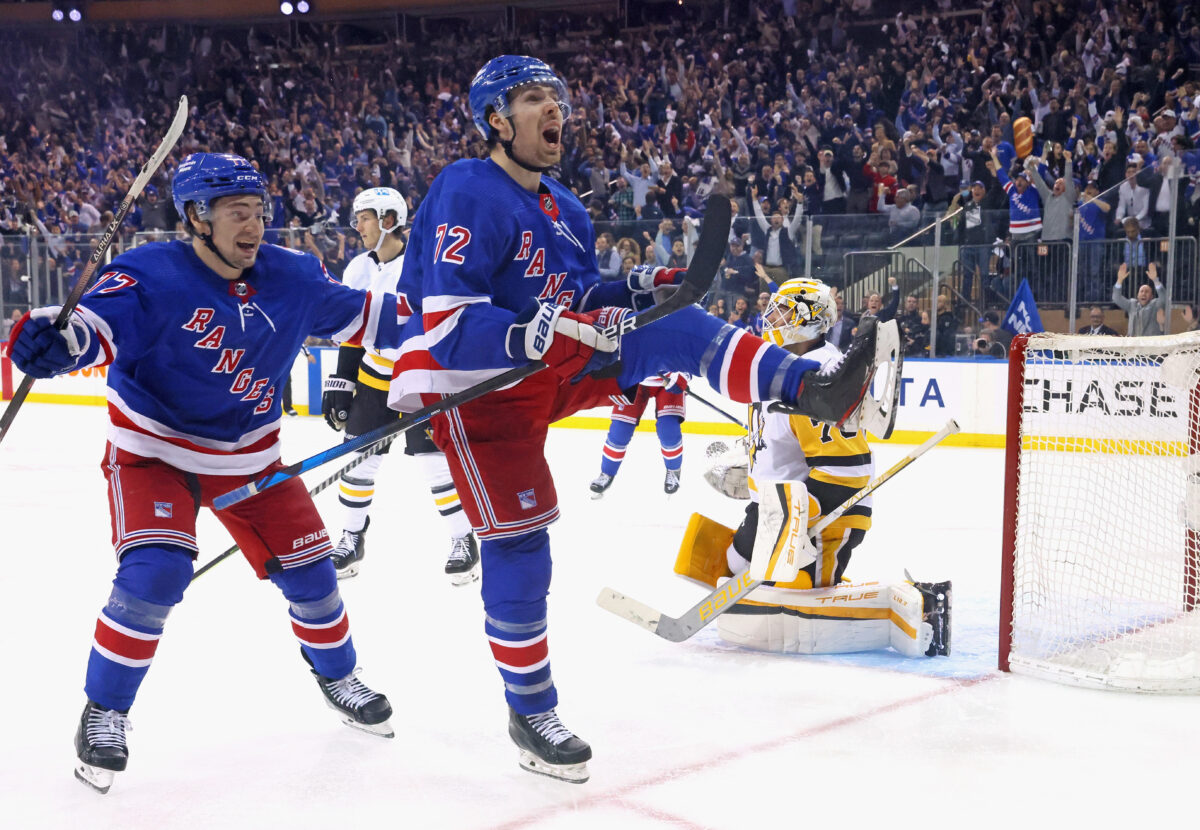
Chytil delivered three goals over the final two games of the Rangers’ seven-game comeback triumph over the Carolina Hurricanes in the second round, and he sparked the club’s 6-2 victory over the two-time defending champion Tampa Bay Lightning in Game 1 of the East Final on Wednesday with two more goals. He picked up an assist in Friday’s 3-2 win that gave the Blueshirts a 2-0 series lead. Chytil has seven goals and two assists in this postseason.
Chytil’s ascendance on the big stage is sure to continue to be critical to these Rangers’ hard-to-fathom quest for a Stanley Cup. In fact, his game and situation recall a player from the Blueshirts’ last championship – and might also provide a cautionary tale for both Chytil and the organization.
Chytil’s Game, Impact Playoff Effort Evoke Memories of Kovalev
It’s easy to see Alexei Kovalev of 1994 in much of who Chytil is and what he’s doing now. Like Chytil a tantalizing talent, Kovalev was also an Eastern European forward with similar size (6-2, 222) and body type, an uncommon skillset and first-round pick pedigree. Like Chytil, Kovalev could and would periodically dominate shifts with his speed, skating and elite hands, attributes that fully came to bear in the spring of 1994.
Every Rangers fan knows about Kovalev’s outsized role in the Blueshirts’ return to championship glory. Though only in his second season as compared to Chytil in his fifth, and more established after having totaled 43 goals and 51 assists in those first two years, Kovalev was just 21 when he entered the ’94 postseason on a team with serious Stanley Cup aspirations. Without his 21 points in 23 playoff games – and momentum-changing goal in Game 6 of the East Final against the New Jersey Devils – the Rangers would not have ended their 54-year championship drought.
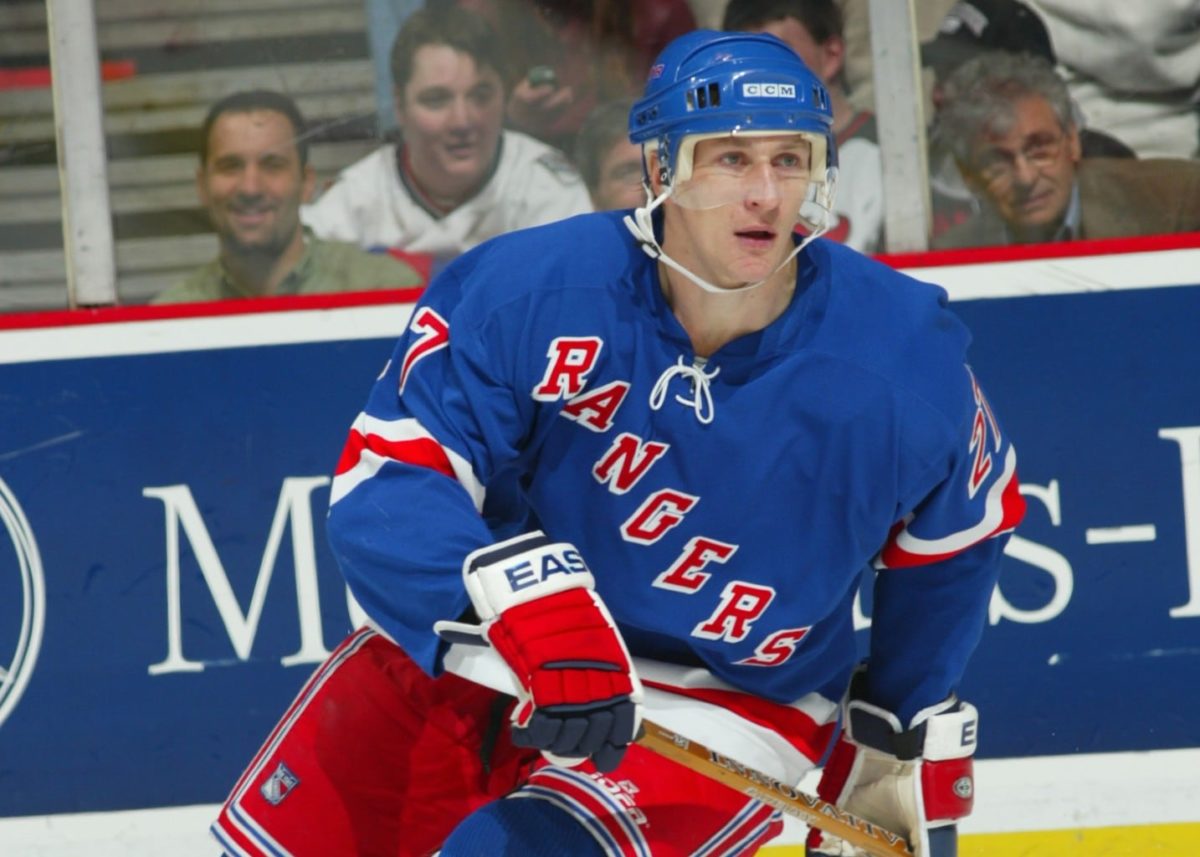
Those Blueshirts thought they had a budding superstar in their midst, one ready to anchor their offense for years to come and help compete for more Cups. After all, how could such ability, with which Kovalev overwhelmed opponents in that postseason, not continue to blossom as he grew as a player?
Unfortunately, every Rangers fan also knows what came next for Kovalev: A maddening inability to rediscover his level of the Cup run, good-but-not great play that always made it seem like more was to come but instead consistently leaving fans, coaches and the front office wanting. In the four-plus seasons he played for the Rangers after the championship year, Kovalev only reached the 50-point mark once. He didn’t do any better in a failed and short-lived Rangers reunion during the 2003-04 season.
That Kovalev largely achieved his potential with the other teams he played for – he recorded 64 or more points eight times while with the Pittsburgh Penguins and Montreal Canadiens, including 70 or more four times and 80-plus in two of those – only added to the mystery of why he couldn’t do so with the team that selected him 15th in the 1991 draft.
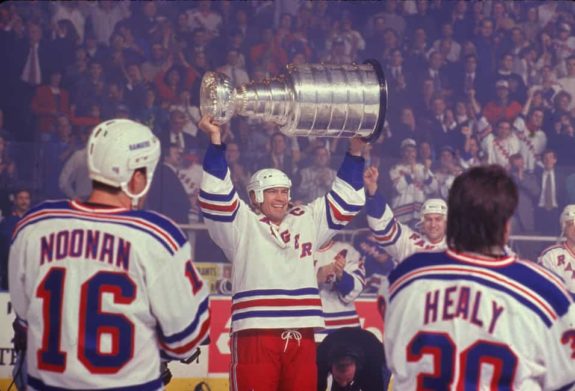
It’s of course unfair to draw too many parallels between Kovalev and Chytil simply because their games are alike and because they authored a pair of big playoff performances. They’re different people. Yet the Rangers – and especially general manager Chris Drury, the Trumbull, Conn. native who grew up a Rangers fan and who as a 17-year-old watched his team’s run to the title – should be wary of placing too much stock in what a great postseason effort means for the future.
Chytil’s Similarities to Kovalev Might Not Be a Positive
Kovalev was the definition of an enigma in New York. While Chytil has been the toast of the town over the past week-plus, it’s easy to forget that the dreaded “e” label could have been applied to him as well before the postseason. Over 253 career regular-season games, Chytil has recorded only 93 points, and never more than 23 in a season. He was not looked upon as a future mainstay amongst the Rangers’ gaggle of young talent.
Vast potential, elite talent, breathtaking moments, but an inability to put it all together and deliver consistently big production. Sound at all familiar?
Again, they’re different people with different stories. Chytil’s path to the NHL might have begun too early when, after turning 18 one month before the start of the 2017-18 season, he forced his way onto the roster with an eye-opening training camp. The NHL proved too big for him, though, and he was sent to the minors after nine games. He failed to make the team before the 2019-20 season, yet went to the American Hockey League and impressed enough to be called up after nine games with the Hartford Wolf Pack, that time for good.
Chytil is known for working hard, for constantly wanting to improve his craft. One of the youngest players in his draft class with a September birthday (he was only 17 when he was drafted), it’s easy to forget that Chytil just turned 22 at the start of this season.
Kovalev was 19 years and eight months old when he debuted on Broadway for the 1992-93 season and had played in perhaps a more formidable situation in Russia, having spent 45 games with Moscow Dynamo, one of the top teams in Soviet hockey. Unlike Chytil, though, his fun-loving and easy-going persona didn’t lend itself to a reputation for having a diligent work ethic – though some of that may have been overblown. What wasn’t much in doubt, however, was that Kovalev could be a stubborn and prideful athlete who was sometimes unwilling to adapt and uninterested in being taught, often frustrating former Rangers coaches Mike Keenan and Colin Campbell to distraction.
Related: Kovalev and the Rangers: Eventful, Successful and Disappointing
Chytil, by all accounts, listens and is receptive to coaching, with current bench boss Gerard Gallant singing his praises amid the steady growth and progress he’s seen from the native of Kromeriz, Czech Republic. Is that and his taking of the playoffs by storm enough, however, for the club to make a huge decision regarding the construction of the roster going forward?
Drury was already facing a major offseason personnel decision over who would hold down the second-line center spot in 2022-23 and beyond. His apparent options before the playoffs were re-signing veterans Ryan Strome or Andrew Copp, both pending unrestricted free agents, or acquiring someone from outside the organization. Now, Drury might have a fourth option, one that would do wonders for his tight salary-cap situation but is potentially fraught with risk.
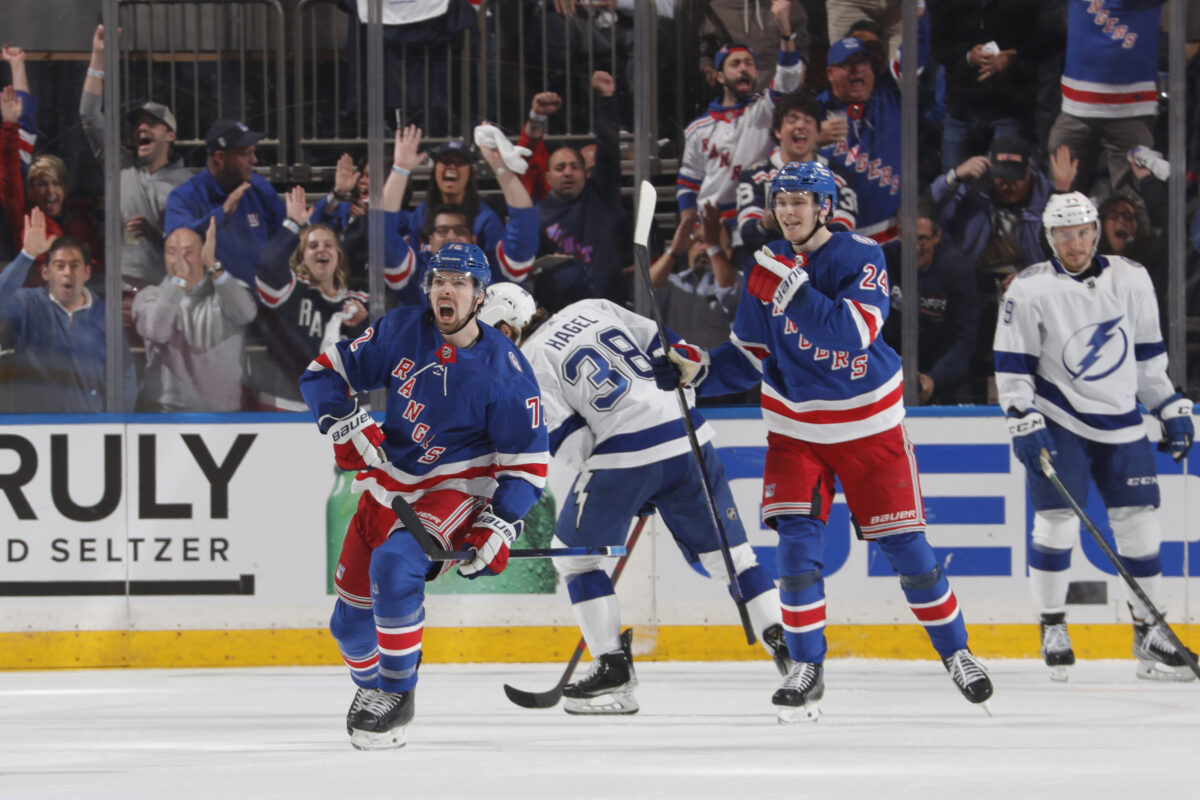
Is Chytil finally growing into a top-six role in the middle, figuring it out as he matures and gains confidence, as Gallant seems to think? The question can’t be avoided now. The assumption had been that Drury would have no choice but to use some of the Rangers’ precious cap space – they’re projected to go into the summer with approximately $13 million – to keep Strome or trade deadline acquisition Copp.
Has Chytil Done Enough to Allow Rangers to Let Copp, Strome Leave?
The front office might still be committed to doing that no matter what. But Drury also needs to re-sign Kaapo Kakko after this season, and fellow young cornerstones K’Andre Miller and Alexis Lafreniere in 2023. Bridge deals coming off those three entry-level contracts, along with a long-term deal for Strome/Copp, are going to make the finances very tight over the next two summers – and rising rookie defenseman Braden Schneider’s ELC expires after the 2023-24 season. Even if the Rangers can find a way to make the money work with a Strome/Copp retention next season – hardly a certainty – there won’t be room for much else in the next few years.
Chytil, by contrast, comes with a $2.3 million cap hit for 2022-23. If he’s ready to move up in the world and into the top six – either joining Artemi Panarin, or bringing his Kid Line running mates Kakko and Lafreniere with him as the new second forward unit – the Rangers could potentially allow Strome and Copp to walk.
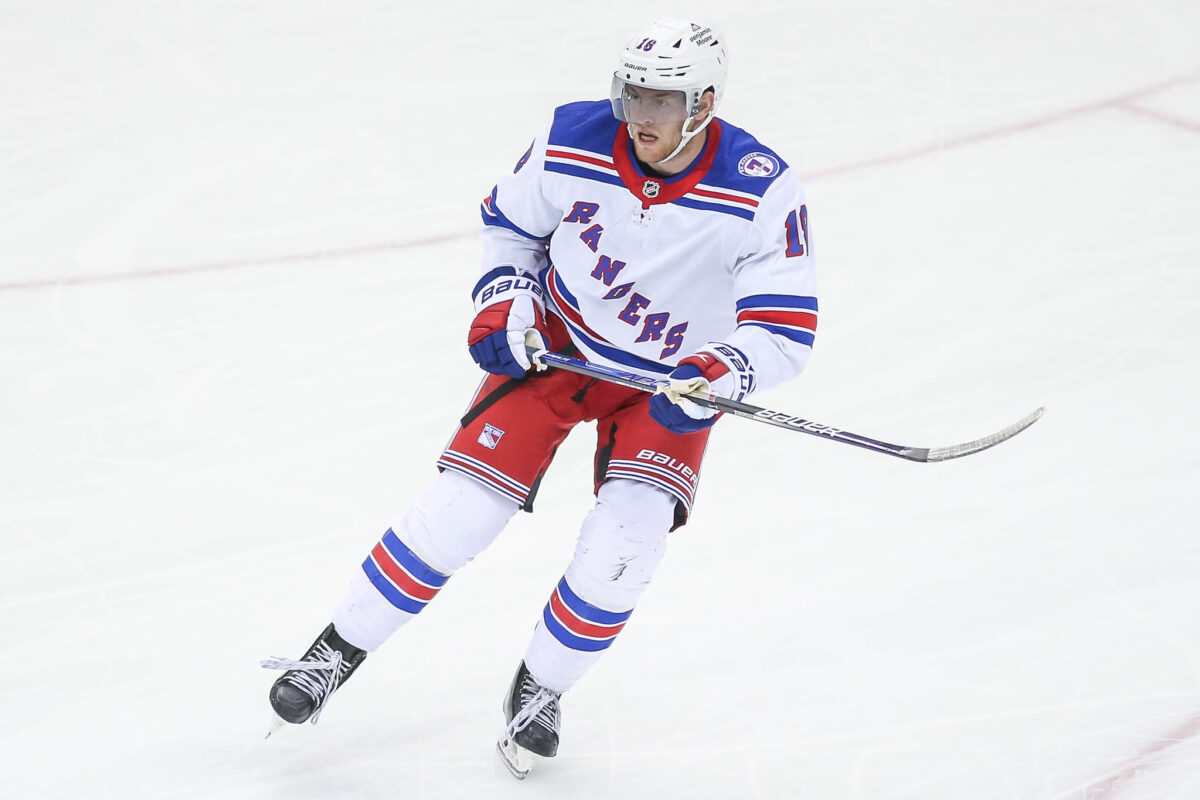
With that extra cap space, Drury would have more flexibility in locking up his young talents. He also might be able to re-up Tyler Motte, another of his outstanding deadline pickups, and work toward building a lockdown third-line checking unit that resembles the Carolina Hurricanes’ outstanding Nino Niederreiter-Jordan Staal-Jesper Fast trio. The Rangers would of course also have to account for re-signing Chytil after next season when he becomes a restricted free agent.
Relying on high-end – and relatively inexpensive – young talent to step up seems like sound thinking. The club didn’t draft Chytil, Lafreniere (first overall in 2020) and Kakko (second in 2019) to play bottom-six roles. As such, it’s hardly a radical idea to reward their rises and challenge them by giving them significantly more responsibility starting in 2022-23.
Yet there’s always danger in working off of small sample sizes when trying to project a player’s future. The Rangers and Drury should know this as well as anyone. The organization went into the lockout-shortened 1995 season believing it possessed a player who was about to ascend into the league’s upper echelon as it looked to defend its title. Instead, that season marked the beginning of Kovalev’s frustrating years-long meander out of town. He was never nearly as good for the Rangers in the regular season as he was in those ’94 playoffs, and he was an easier player to project out as a budding star than Chytil, having had more initial success with the Rangers.
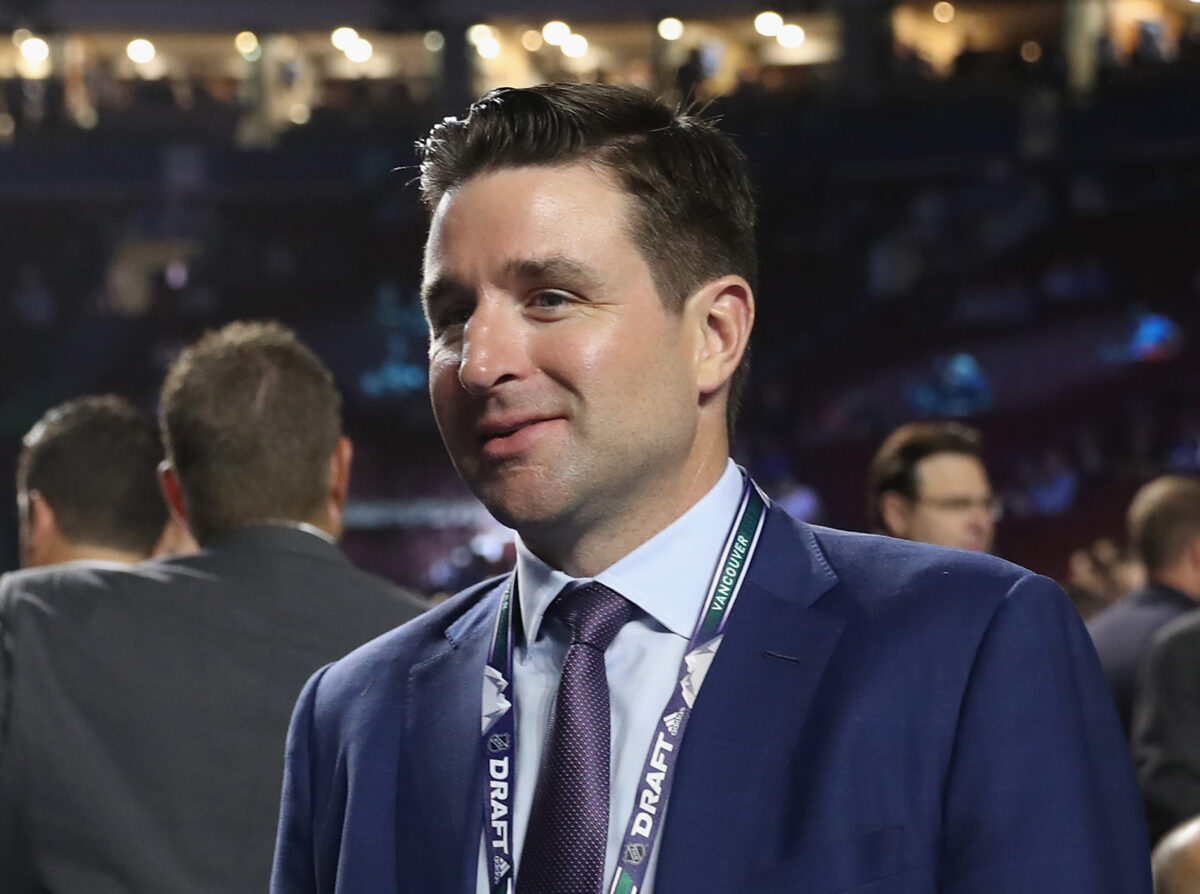
Can Chytil avoid that path and fully grow into the player that he’s been in this postseason, the big, strong, skilled, power-skating center that’s been too much for opponents to handle? It would benefit Drury and his club greatly to bet on that happening – but as the Rangers’ own history shows, there’s every chance that it won’t.